Here is a map drawn of the Sunless Citadel, which Inigo was keeping.
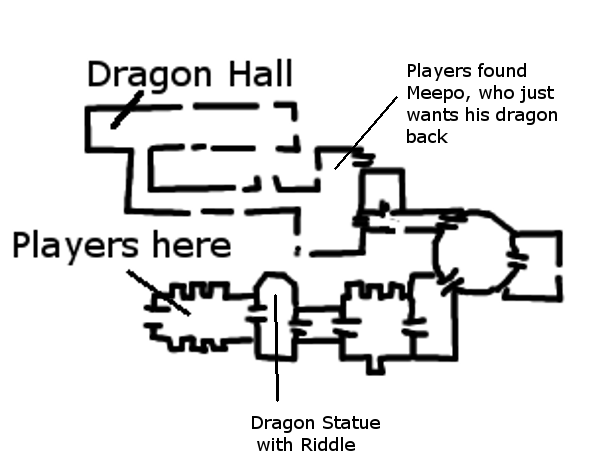
Here is a map drawn of the Sunless Citadel, which Inigo was keeping.

The Orcs of the Wolf Axe roam the trackless plains. They are warlike and nomadic religious fanatics. The tribes move across the plains with wagons pulled by boars, and on foot. They do not rest, as the gnolls and the orcs are in a constant war of attrition, with the orcs destroying the gnolls when they are found, and the gnolls hunting small bands of orcs when they can find them.
The Orcs would like to invade the forests of the Deepening wood, to build fortifications and finally stop the constant warfare against the gnolls, but the elves and the sylvan entities in the wood beat them back over and over again. They fear and loathe the elvish rangers and protectors of the woods, and are normally keen to attack any elves they see.
The Orcs send out raiding bands of 15 to 25 Orcs to hold strong points and make things difficult for their adversaries. That number of Orcs is usually strong enough to take out a Gnollish hunting party, and is too great for a single Elvish Ranger to deal with by themselves.
The Orcs all worship Gruumsh, and sometimes their dark god chooses a champion, called an Eye of Gruumsh. These are incredibly tough warriors and spellcasters, and one does not want to come up against them.
The Orcs occasionally ride Dire Boars. There are tales that one of the Eyes of Gruumish rides an owlbear, and that this is a truly formidable orc.
The Gnolls of the Trackless Plains are a terror that makes caravaning across the plains to the great cities of the Southwest difficult at best, and often deadly.
Gnolls are the spawn of Yeenogu, a demon prince of the abyss who thrives on savagery and slaughter. It is said they come from hyenas that followed the Lord of Savagery on a rampage, and ate the corpses left behind. When they rested, they transformed into Hyena/Demon hybrids in a shower of pain and gore.
They are always hungry, and only the flesh of intelligent creatures satisfies their hunger. Strength, hunger, and fear are their three major concepts: Strength to overcome foes, hunger motivates the gnoll to go forth and slay, fear is a weapon used to make enemies easy prey.
They cannot be negotiated with, their only object is to slay all other creatures, until all are dead. Once all the other beings are gone, the gnolls will turn on each other until only one is left. Then Yeenogu will come, kill the champion, and rule over a material plan full of corpses.
The Fangs of Yeenoghu are gifted with the power to create more gnolls by anointing the remains of their foes. When the corpses are eaten by hyenas, the hyenas become gnolls. Sometimes other humanoids are forced to partake in the feast, they become crazed cultists.
Even death cannot dissuade the gnolls, as their leaders can raise the corpses of killed gnolls as undead Witherlings.
They are a plague upon the plains, and are kept in check by the efforts of Elven Rangers and other guardians of the forest, to keep the route east and west clear. The Wolf Axe band of Orcs of the plains also war with the gnolls.
 The Book of the Sun
The Book of the SunDescribes how Pholtus carves a path in the sky for the sun to follow and thus, how he rules the sun.
Excerpts:
“Light shall penetrate and overcome darkness.”
“The light dawning in the darkness, and the darkness comprehendeth it not.”
“The sun rode too close to the Land, and the land burned. Then Pholtus moved it further out, and the Land grew Cold, and ice covered the land. Then Pholtus moved it to the perfect distance, and set it to roaming around the world.”
“The peoples at the ends of the world complained, they were in darkness much of the year, and the peoples at the middle complained, saying it was always too warm. Pholtus heard their words, but despaired of altering his perfect harmony. Pholtus said “We shall not upset the celestial order which We have established.” Pholtus said “We could disturb terrestrial order.” And so Pholtus set the land to rotating as a top, with the top pointed at an angle, that described a circle in the celestial plain. The poles of the Land sometimes pointed towards the sun, and sometimes away, in a regular movement, so as to establish the seasons.”
 The Book of the Moon
The Book of the MoonDescribes how Pholtus carved paths in the sky for the moons, and why he rules the moons
Two Sisters, Luna and Celeste, lived on the Land, and ran through the fields and forests. Pholtus shone the lamp of the sun upon their frolicking, and was much pleased, for they were beautiful. Nerull in his dark realms heard their constant laughter and running, and was vexed. He tempted Luna to one of his caves, took her and killed her, and carved her body into 14 parts. He hid those parts in all the holes of the world.
Celeste ran and ran trying to find her sister. She ran over the whole world, and eventually found the 13 parts. She piled them together, and appealed to Pholtus to help her. Pholtus lifted the sisters and the parts into the sky, and set their courses. Luna runs her course in 28 days, and gets dimmer and dimmer as she loses parts until all are gone, and then brighter and brighter as she finds them again. But she never finds them all, and so starts losing them again.
Celeste runs through the heavens faster than Luna, every 6 days, trying to collect the parts and keep them together, or putting them all on Luna again.
 The Book of the Law
The Book of the LawDescribes the rigid path of righteousness, and explicates the One True Way.
“Every person is born into a social contract from which he will not stray.”
“Declaring the Works of Pholtus, to all who Shall listen is not only a sign of a Devout Person, but is the Mission of Each Individual Person, and thus the Teachings and Precepts of the Church.”
“Every person shall give his all to society. Each citizen contributes according to his god given abilities and shall work within his profession for the bettering of society. Rest and recreation are fundamental to maintaining productivity and therefore shall not be neglected. One shall not overindulge or be lazy.”
“Unnecessary violence, fomenting rebellion, and theft are all examples of crimes which result in the breakdown of the social order and as such shall be forcefully resisted and those perpetrators shall be harshly punished.”
“There is but One True Path, and it is only through Pholtus that you will find it.”
 The Book of the Good
The Book of the GoodDescribes good works that are to be done by Pholtus’ followers.
“Every person is an integral part of society that demands responsibilities and sacrifices to the community”.
“Every person owes loyalty first and foremost to Pholtus, our guardian and savior. Next, he owes loyalty to the Pholtan Church for guiding us on our enlightened path. Then he owes loyalty to his community, without which he could not survive. Then he owes loyalty to his family, which provides him with support. Lastly, he owes loyalty to himself for without him, there would be no family, community nor Church. One shall not take actions that would benefit one’s self, family, community or church to the detriment of a higher ranking loyalty. For instance, one shall not take actions that would benefit himself to the detriment of his family, community, Church or Pholtus.”

Establishes the Priesthood and describes the knowledge for the chosen ones to follow his Righteous Ways.
“Knowledge is the only Path to Illumination.”
“Truth in the Scriptures is only exceeded by Truth in the Path of Pholtus”
“Your only salvation is through the Church of the One True Path”
 The Book of the Deeds
The Book of the DeedsEstablishes rules for the clergy, as well as sermons, chants, songs, and details of preaching. Details vestments (white with silver or gold accents to indicate status and rank within the Church), lays out how missionaries should behave, etc.
“There is but One True Path of Divine Truth in Pholtus. The Ultimate and Universal Truth of Pholtus is stated herein, and this Covenant and Statement between the Faithful of Mine Own and the Faith in the Church is the Sealing Manifestation of the Only True Path to Salvation.”
“Every citizen shall do his utmost to maintain order. He shall not take actions that spread chaos, discord or disharmony. He shall act within his means and capabilities to stamp out chaos, discord or disharmony wherever he meets it.”
“Adherence to Laws as established by the chosen representatives of Pholtus is absolute. Deviation from the Law or the spirit of the Law or the intent of the Law shall be viewed as a direct attack on the One True Path as given to us by Pholtus.”
“Keep your being clean and pure in Faith and Doctrine, and Pholtus will keep you in His Light”
 Apocryphal and False books
Apocryphal and False booksThere is one authentic book of Pholtus that is not included in the Book of Blinding Light. It is The Malleus Rancidulum, the Hammer of Ghouls; a manual of combatting the undead: How to identify them, how to dispose of them, locations, techniques, etc. It is said to be lost, as the Church knows of no existing copies. It is mentioned in the book of the law, and excerpts are found in Mordenkainen’s Letters.
There are several books of Pholtus whose provenance is not known, and that are not regarded generally as authentic. These include the Book of the Darkness or the Ebongleam, The Book of Judgement, Moonshadow, and Glimmer, Epitome of the Burning Sun. Several of these books are believed to be lost.
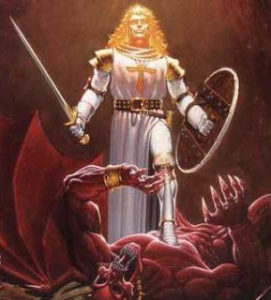 Pholtus is the god of light, resolution, law, order, inflexibility, sun, moons. His priests are about keeping order, doing good for the community, making converts, and rooting out heretics. Generally in that order, but not always. He’s very concerned with law, and his association with the sun and moons is because he keeps them in their appointed courses. His association with light highlights his directness and inflexibility, as a beam travels in a straight line.
Pholtus is the god of light, resolution, law, order, inflexibility, sun, moons. His priests are about keeping order, doing good for the community, making converts, and rooting out heretics. Generally in that order, but not always. He’s very concerned with law, and his association with the sun and moons is because he keeps them in their appointed courses. His association with light highlights his directness and inflexibility, as a beam travels in a straight line.
Priests of Pholtus have a strict hierarchy, with a patriarch in Efros (There are other patriarchs for other nations and kingdoms). Pholtus worship is not common in Efros, but is gaining ground as the kingdom becomes more unstable.
Pholtus’ main holidays are solar, taking place on the Solstices and Equinoxes. They are The Birth of the Light (Winter solstice), The Judgement of Pholtus (Spring Equinox), The Light Ascendant (Summer Solstice), and Preparation for the Chaos (Fall Equinox).
There are also minor holidays, such as when both moons are full, or both are dark, etc.
Followers of Pholtus follow the one true way, which is summarized in the following ways:
 The Book of the Blinding Light
The Book of the Blinding LightThe Book of the Blinding Light is a collection of six books of lore about Pholtus. It is generally found as one volume, but individual volumes have been found from time to time. Some of the volumes are ornate, decorated with scenes and images illustrating the stories in the books.
The books are:
The Book of Deeds (by far the largest book) includes several hymns, including the most popular, O Blinding Light, handed down by St. Gygax himself.
Oh Pholtus,
O’ Blinding Light,
Bright is your Wisdom.
Aid us it will to conquer the Heretics.
O Blinding Light,
Give us the Light of the Day, as we praise you at Dawn.
Give us the Light of the Night, as we praise you at Dusk.
O Blinding Light.
I praise the Word of Pholtus,
O Blinding Light.
Defending His honor.
O Blinding Light.
I reveal your Light to the Converts.
O Blinding Light.
Protect us, your faithful servants.
O Blinding Light of Pholtus.
Light, The Divine Substance From The Creator.
Other hymns include
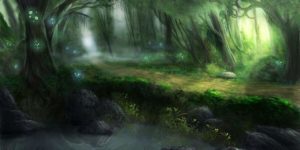 The Deepening Wood (Glad Tovan in Elvish) is the Elvish ‘County’ (Actually a Monarchy/Queendom), currently ruled by Ilthuryn Ulaquinov, mother of Lady Sariandi Ulaquinov (styled as the ‘Countess’ of Beevale).
The Deepening Wood (Glad Tovan in Elvish) is the Elvish ‘County’ (Actually a Monarchy/Queendom), currently ruled by Ilthuryn Ulaquinov, mother of Lady Sariandi Ulaquinov (styled as the ‘Countess’ of Beevale).
The ranks of nobility in Elvish society are fairly fluid. The Elves have adopted the terminology, but the ranks don’t confer the same level of respect and deference that human or dwarven nobility commands. Elves value personal responsibility in the aim of the good of all, and as such they are generally a very egalitarian people. Thus, the nobility is acknowledged more as those who take broader responsibility, rather than those who have greater privilege.
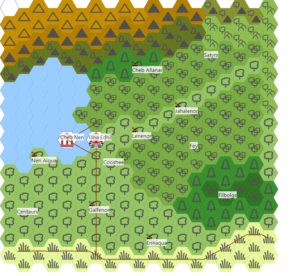
The Deepening Wood is quite large. The approach from Poordirt is a slight incline, into a deep valley that ends in an enormous lake, secluded and remote from the contentions of humans and others by a series of mountains and forests. The trees are enormous, and shade the shores of the lake so that the effect is that the whole of the area is dim and twilight.
The main city is Illna Edhil (Sacred Grove). This is the largest gathering of elves, but they live throughout the Deepening Wood. The vast majority of the buildings and structures are living: hollow trees, halls made of saplings grown together over generations, bridges of vine spanning one tree to another. The locations are both vertical and horizontal, and it is nearly impossible to tell where the forest ends. There are no maps, no grids, and only signs and guides discernable to elves and druids. Cheb-Nen and the Archive of Illna Nöle seem very, very old, but the rest of the city is living and vibrant. The atmosphere is damp and humid, but the temperature is always comfortable, and most druids know the cantrips for drying out if it’s needed. The light is generally dim, and sunbeams don’t often reach the floor of the city. There are several upper buildings that are more exposed to sunlight. Most of the rooms and buildings are spacious, although they’re hosted in trees. It may be a trick of the eye, an illusion; it may be ancient magics that make things bigger on the inside than they seem on the outside.
Illna Edhil has several interesting locations:
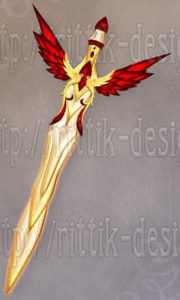 This sword has a blade of a red-gold color, styled to resemble a bird’s wing. The guard also resembles bird wings, outstretched. The pommel bears a single ruby. Inscribed in elvish on one side is Narwa, on the other Soron, meaning Red Eagle.
This sword has a blade of a red-gold color, styled to resemble a bird’s wing. The guard also resembles bird wings, outstretched. The pommel bears a single ruby. Inscribed in elvish on one side is Narwa, on the other Soron, meaning Red Eagle.
The Red Eagle was the sword of a renowned Elvish General Navarlas, called Birdfriend, who fought the Blood Wars against the orcs, and helped to break the Orcish horde invading the Deepening Wood, two elvish generations ago.
After Navarlas passed to the Feywild, the sword was given to the Rangers of Rove Water to aid in their protection of the forest across the Poordirt river. Albin, the last of the Rove Water rangers, was the previous owner.

The Inscription
Mechanics: Magical longsword, +1 to hit and damage. If the inscription is pronounced in elvish (Narwa Soron), it will cast the spell feather fall. Pointing the blade and saying Narwa (Red) will cause red dancing lights to appear where the sword is pointed, 30 feet away. Pronouncing Soron (Eagle) alone will cause a minor illusion of an eagles cry, very loud and distracting, from a direction wherever the sword is pointed, 30 feet away. All these spells are cast as bonus actions.
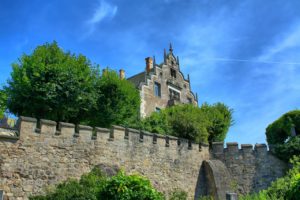 Cleaver Castle was originally built by the Kraghand dwarven clan, who were instrumental in the founding of Poordirt. The Kraghands built Cleaver castle on the great cliffs overlooking Poordirt and the Three Rivers Ford, giving it a great view of the approaches, and making sure it was defensible and difficult to approach.
Cleaver Castle was originally built by the Kraghand dwarven clan, who were instrumental in the founding of Poordirt. The Kraghands built Cleaver castle on the great cliffs overlooking Poordirt and the Three Rivers Ford, giving it a great view of the approaches, and making sure it was defensible and difficult to approach.
Cleaver Castle is the traditional seat of the Barons of Poordirt, first the original Cleaver family, then the Hasencleavers, who were a distant branch of the family. The original Cleavers were very martial and warlike, expanding the ambitions of the Efros kingdom, and intermarrying with the royal family. The Hasencleavers have not continued that tradition, and allowed the castle to decay some. The Baron’s Guard, revitalized by the champion Gilbert the Honorable, restarted some of the military aspects of the family. However, they do not receive a lot of support from the Baron himself, who prefers politics and diplomacy to warfare.
The castle broods over Poordirt, it’s towers looking old and decayed, it’s defenses seemingly weakened. The gate is never closed, and only the Guard knows if it can be closed. It reminds one of the Baron: aging, decaying, soon to only exist as relic.